BM-14
The BM-14 (BM for Boyevaya Mashina, 'combat vehicle'), is a Soviet-made 140mm multiple launch rocket system (MLRS), normally mounted on a truck.
| BM-14 | |
|---|---|
A 140mm, 16-round launcher (BM-14) mounted on a GAZ-63 truck. | |
| Type | Multiple rocket launcher |
| Place of origin | Soviet Union |
| Service history | |
| In service | 1952 - c.1990 (USSR)/ present (Others) |
| Wars | Algerian Civil War Vietnam War Dhofar Rebellion Angolan Civil War Soviet-Afghan War[1] War in Afghanistan (2001–present) Syrian Civil War |
| Production history | |
| Designer | NII 303 |
| Designed | 1950 |
| Specifications | |
| Mass | 5,323 kg (11,735 lb) |
| Length | 5.4 m (17 ft 9 in) |
| Width | 1.9 m (6 ft 3 in) |
| Height | 2.24 m (7 ft 4 in) |
| Crew | 6[2] |
| Caliber | Diameter: 140 mm (5.5 in) Length: 1 m (3 ft 3 in) Weight: 39.6 kg (87 lb) |
| Barrels | 16 in two rows |
| Elevation | +50°/0° |
| Traverse | 180° |
| Muzzle velocity | 400 m/s (1,300 ft/s) |
| Maximum firing range | 9.8 km (6.1 mi)[2] |
| Engine | GAZ-51 70 HP 6-cylinder petrol |
| Suspension | Wheeled GAZ-63 4x4 chassis |
Operational range | 650 km (400 mi) |
| Maximum speed | 65 km/h (40 mph)[2] |
The BM-14 can fire 140mm M-14 rockets with a high-explosive fragmentation warhead, a smoke warhead or a chemical warhead. It is similar to the BM-13 "Katyusha" and was partly replaced in service by the 122mm BM-21 Grad.
Launchers were built in 16 and 17-round variants. The rockets have a maximum range of 9.8 kilometers (6.1 mi).
The weapon is not accurate as there is no guidance system, but it is extremely effective in saturation fire.
Variants
- BM-14 (8U32) - 16-round model (two rows of 8), launcher mounted on the ZiS-151 truck. Entered service in 1952. Also known as BM-14-16.
- BM-14-17 (8U35) - 17-round (8+9 launch tubes) launcher, mounted on the GAZ-63A. Developed in 1959. This launcher was also used on naval vessels, for example Project 1204 patrol boats.
- BM-14-17M (8U35M) - modified model, mounted on the GAZ-66.
- RPU-14 (8U38) - towed 16-round version, based on the carriage of the 85mm gun D-44 and used by Soviet Airborne Troops, where it was replaced by the 122mm BM-21V "Grad-V".
Ammunition
The BM-14 launcher and its variants can fire 140mm rockets of the M-14-series (also called Soviet-made M14 artillery rockets). They have a minimum range of 3.8 kilometers (2.4 mi) and a maximum range of 9.8 kilometers (6.1 mi).[3] The M-14 series consist of three known types:
Use
During the Syrian Civil War, a rocket engine from a 140 mm M-14-series rocket was identified on 26 August 2013 by the U.N. fact-finding mission in the Muadamiyat al-Sham district southwest of Damascus, allegedly originating from the chemical attack on Western Ghouta on 21 August 2013.[5]
The rockets nozzle assembly had 10 jet nozzles ordered evenly in a circle with an electrical contact plate in the middle. The bottom ring of the rocket engine had the lot number "Г ИШ 4 25 - 6 7 - 179 К" engraved,[5](pp21–22) which means it was produced in 1967 by factory 179 (Sibselmash plant in Novosibirsk).[6] However, no warhead was observed at the impact site and none of the 13 environmental samples taken in the Western Ghouta area tested positive for sarin, although three had "degradation and/or by-products" possibly originating from sarin.[7](pp43–45) On 18 September, the Russian Presidential Chief of Staff Sergei Ivanov commented on the U.N. missions findings. He said "these rockets were supplied to dozens of countries", but that "the Soviet Union never supplied warheads with sarin to anyone".[8] Another type of rockets was used in the Eastern Ghouta attack.[3]
Operators

Current operators

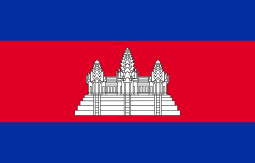

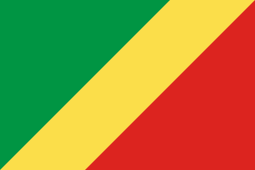



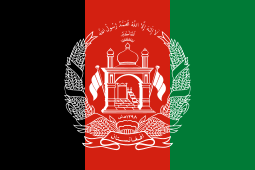

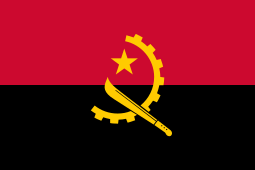
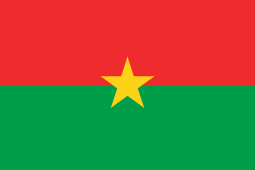

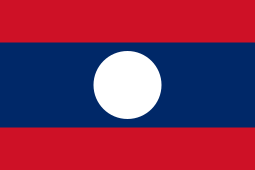





Former operators


Similar designs
- The Type 63 130mm multiple rocket launcher (not to be confused with the towed Type 63 of 107mm) is the Chinese version of the BM-14-17. It has a slightly smaller calibre but is fitted with 19 instead of 17 launch tubes. The Type 63 MRL is based on the Nanjing NJ-230 or 230A 4x4 truck, a licence-produced version of the Soviet GAZ-63/63A.
- The WP-8z (Polish: Wyrzutnia Pocisków rakietowych) was a Polish towed rocket launcher that was developed in 1960. The weapon was subsequently produced between 1964 and 1965. It fired the same rockets as the RPU-14 but had only 8 launch tubes. The main operator was the 6th Pomeranian Airborne Division (Polish: 6 Pomorska Dywizja Powietrzno-Desantowa).[20] with 12-18 WP-8s in its inventory.[21][22]
See also
- BM-12 multiple rocket launcher
- Katyusha World War II multiple rocket launchers (BM-13, BM-8, and BM-31)
- M16 (rocket), U.S. 4.5 inch multiple rocket launcher
- BM-21 Grad 122 mm multiple rocket launcher
- BM-27 Uragan 220 mm multiple rocket launcher
References
- Isby, David C. (1990). The War in Afghanistan 1979-1989: The Soviet Empire at High Tide. Concord Publications. p. 41. ISBN 978-9623610094.
- Foss, Christopher (1977). Jane's pocket book of towed artillery. New York: Collier. p. 171. ISBN 0020806000. OCLC 911907988.
- "Attacks on Ghouta" (PDF). Human Rights Watch. 10 September 2013.
- "Projectile and Warhead Identification Guide". US National Ground Intelligence Center. Scribd.com. 1 January 1997. Retrieved 29 April 2015.
- Sellström, Åke; Cairns, Scott; Barbeschi, Maurizio (16 September 2013). "Report of the United Nations Mission to Investigate Allegations of the Use of Chemical Weapons in the Syrian Arab Republic on the alleged use of chemical weapons in the Ghouta area of Damascus on 21 August 2013" (PDF). United Nations. Archived from the original (PDF) on 17 September 2013. Retrieved 29 April 2015.
- "Chemical weapon propulsion unit on Syrian missile 'made in Siberia', says Russian expert". The Siberian Times. 18 September 2013.
- "The final U.N. report" (PDF). United Nations Mission to Investigate Alleged Uses of Chemical Weapons in the Syrian Arab Republic. 13 December 2013.
- "Kremlin denies Soviet Union supplied warheads with sarin to other countries". Itar Tass. 18 September 2013.
- Military Balance 2016, p. 320.
- Military Balance 2016, p. 239.
- Military Balance 2016, p. 393.
- Military Balance 2016, p. 438.
- Military Balance 2016, p. 324.
- "Archived copy". Archived from the original on 23 April 2014. Retrieved 10 May 2015.CS1 maint: archived copy as title (link)
- Military Balance 2016, p. 354.
- Military Balance 2016, p. 297.
- Zabecki, David T. (May 2011). "Rockets and Rocket Launchers". In Tucker, Spencer C. (ed.). The Encyclopedia of the Vietnam War: A Political, Social, and Military History (2 ed.). p. 988. ISBN 978-1-85109-960-3.
- Operations Modular and Hooper
- Russian Army Equipment
- "Defense & Security Intelligence & Analysis: IHS Jane's | IHS". Articles.janes.com. Retrieved 3 September 2013.
- "6 PDPD". Oocities.org. Retrieved 3 September 2013.
- "Wyrzutnia rakietowa WP-8z". Militarium. 17 February 2009. Archived from the original on 27 September 2013. Retrieved 3 September 2013.
External links
| Wikimedia Commons has media related to BM-14. |
Bibliography
- Prenatt, Jamie; Hook, Adam (2016). Katyusha – Russian Multiple Rocket Launchers 1941–Present. New Vanguard 235. Oxford: Osprey Publishing Ltd. ISBN 978-1-4728-1086-1.
- International Institute for Strategic Studies (February 2016). The Military Balance 2016. 116. Routlegde. ISBN 9781857438352.